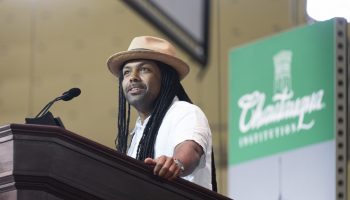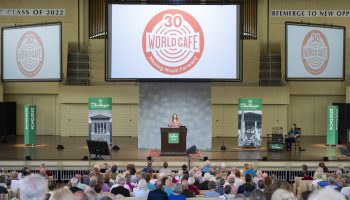Guest Column by Kory Stamper
When you hear “written word,” the image that pops to mind is straight out of a fairytale: expansive libraries, big books bound in richly tooled leather, some quill pens and some gravitas. Maybe a cavalcade of authors are processing through your mind, their portraits making up a very sedate, wise, and mostly monochromatic parade. You’re likely not picturing the paperback thriller you’ve shoved in your vacation bag this week, or the trashy magazines you only buy when you’re at the airport (really, you swear!). “The written word” is a category made up of weighty and enduring works, not the sort of ephemeral pulp that litters the grocery store check-out.
So we all assume. Or, to let you off the hook, so I assumed when I first began writing dictionaries for a living.
One of the first things you encounter as a lexicographer is your own measly understanding of what “the written word” really is. Founding Father and lexicographer Noah Webster — yes, that Webster — frames the inherent problem of writing dictionaries by laying out the basic job description. Lexicographers are “to collect, arrange, and define, as far as possible, all the words that belong to a language, and leave the author to select from them at his pleasure and according to his judgment.”
It’s very easy to focus on “all the words that belong to a language” in isolation, but for the lexicographer, it’s that first bit that rearranges the mind in an unsettling way: “collect, arrange, and define … all the words.” To collect all the words that belong to a language, you need to go where the language goes. And the language goes in some very disorderly and un-gravitas-ed places.
We think of English as a monolith — a great, stark, uniform mass, unchanging and eternal as time itself, but nothing could be further from the truth. A language that is static, that has neat edges and tidy vocabulary, is a language well on its way to the boneyard. A healthy and flourishing language is one that is on the move, changing and changeable. A living language is being constantly formed and re-formed by the people who speak it in accordance with the needs of the moment. In other words, language isn’t math. Language is people. And people, generally speaking, are a hot mess.
For the lexicographer, this means that all edited, published prose is given the same weight when deciding whether a word should be entered and defined in a dictionary. This can cause some cognitive dissonance: you mean to tell me, a college graduate, that the language of Shakespeare and the language that appears in Vibe Magazine are on equal footing? For the purposes of collecting evidence of the language as it’s used, they are. Remember Webster’s dictum: “all the words that belong to a language.” No one source — or one type of source
— contains all the language. You must go where the language is used to collect evidence of different types of English: formal, informal, slang, historical, archaic, technical. That means that a lexicographer can’t focus only on academic writing. Today’s Chemist At Work isn’t going to use slang, but slang is one of the places where language grows the most.
Which brings us to the second part of Webster’s quote: “leave the author to select from them at his pleasure and according to his judgment.” Most people assume that the dictionary’s job is to mark which words are a part of “real” or “proper” English. After all, dictionaries are a record of “the written word.” If you could compound literary solemnity and bind it in buckram, you’d end up with a dictionary. Right?
Not exactly. Dictionaries record the language as it’s used, not as we would like it to be used. And once you begin looking at the whole of the written word, you discover that plenty of well-respected authors occasionally use unrespectable language. Jane Austen used “ain’t” and John Dryden used “nauseous” incorrectly. To ignore those uses because they don’t fit my particular idea of what constitutes “Proper English” is a dereliction of duty, not an act of saving the language from itself.
But how, you may wonder, can we trust people to use language correctly according to their judgment? There are people in the world who eat TidePods — you’re going to leave the language in their hands?
We are, because we have. English is a remarkably resilient language. It’s been around for almost 1,500 years, and for the first half of its life, no one thought it would outlast Latin. (It has.) It wasn’t seen as a language worth recording until the turn of the first millennium, and it took another 600 years for anyone in power to think it was a good enough language to translate something as serious as the Bible into. It’s now the lingua franca — as global a language as we are probably ever going to get in our lifetimes. And this in spite of the fact that Shakespeare used double negatives and Chaucer used the singular “they.”
The wonderful and terrifying thing about English as it’s actually used is that it is a true democracy. Every speaker and writer of the language gets a tiny say in where it goes, which means that no one person (or one group) gets to determine its path. There are those who see this as a marker of its inevitable demise, but there’s nothing new in that: complaints about the death of English at the hands of foreigners or idiots go back to the 1100s. Yet English continues on, lascivious and wild — mostly thanks to that ragtag paperback in your vacation bag.
Kory Stamper is a longtime lexicographer who has worked at Merriam-Webster, and is the author of Word by Word: The Secret Life of Dictionaries. Her writings on language have also appeared in The Guardian, The New York Times, and The Washington Post.





